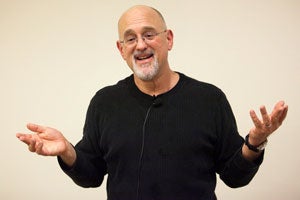There is a simple method for making decisions, from trivial to life changing, that most people find easy to understand but impossible to follow. In a talk entitled “How To Do Precisely the Right Thing At All Possible Times,” Daniel Gilbert, Professor of Psychology at Harvard University, author of “Stumbling on Happiness,” and host of the PBS television series “This Emotional Life,” discussed research in psychology, neuroscience and behavioral economics that explains why it is indeed possible, yet incredibly difficult, to do the right thing at all possible times.
Gilbert’s talk was sponsored by the Living Well in the Law program at Harvard Law School, which endeavors to complement the teaching of the skills and substance of the law with attention to and development of each student’s sense of purpose as both a professional and a person.
Gilbert explained that our own minds thwart our attempts to make good decisions because our brains evolved to function in a world very different from the one we live in today, one in which decisions were limited to finding a mate and living in small communities, not purchasing long-term care insurance or making other complex decisions.
“We’re on an ancient vessel and can’t evolve quickly enough, but we’re not stupid,” Gilbert said. “The way we got to the moon wasn’t through intuition—we used science and disciplined rational thinking. We can use the same approach to make any kind of personal decision. The question isn’t whether we know how to do precisely the right thing at all the right times. The question is whether we will actually use what we know.”
He said that it should be simple to make a decision—all we need to do is multiply the odds of getting what we want by the value of getting it. But people make two classes of errors when trying to make decisions: errors in odds and errors in value.
Gilbert discussed the psychological phenomena leading to errors in odds, including the imaginability error and the optimism bias. We miscalculate the odds of a particular outcome because the imaginability error causes us to calculate odds based on how easy it is to bring something to mind. For example, people overestimate the odds of dying in a tornado or from using fireworks because those deaths make headlines, while they underestimate the odds of dying by drowning or from asthma, which are in reality far more common. The optimism bias, on the other hand, is simply attributed to the fact that we’re wildly optimistic about the odds of getting what we want, he said. Together, the imaginability error and the optimism bias distort our ability to anticipate odds of a particular outcome.
 “The optimism bias occurs because, when you practice doing things, they become easier to do,” Gilbert said. “Motivational speakers tell you to practice thinking about success and not even let thoughts of failure cross your mind. If you just keep thinking about how your plans will work without being willing to entertain equally how they’re not going to work, success becomes easier and easier for you to imagine, and thus the imagineability error is at play. We practice thinking about success so much that it’s inevitable that we’ll overestimate the likelihood that it’s going to happen.”
“The optimism bias occurs because, when you practice doing things, they become easier to do,” Gilbert said. “Motivational speakers tell you to practice thinking about success and not even let thoughts of failure cross your mind. If you just keep thinking about how your plans will work without being willing to entertain equally how they’re not going to work, success becomes easier and easier for you to imagine, and thus the imagineability error is at play. We practice thinking about success so much that it’s inevitable that we’ll overestimate the likelihood that it’s going to happen.”
Calculating how happy we’ll be if we actually achieve the outcome we want—the value of that outcome—is even more difficult. Anticipating value is so difficult because every form of judgment works by comparison, Gilbert explained. To illustrate that point, he used a decision very familiar to law students—deciding between two job offers. Job 1 offers a salary of $100,000, but everyone else at that firm will earn $105,000. The salary for Job 2 is $90,000, but everyone else will earn $85,000. Gilbert said that most study participants respond that Job 2 will make them happier because, although they’ll make less money, they won’t feel underpaid. But for that to be the right decision, one who chooses Job 2 must then walk around all day in that new job thinking about how wonderful that extra $5,000 is. In reality, people will not spend time making that comparison once they dive in and start the job.
“You forget about the setup. The comparison you make when determining the value of getting what you want is no longer the comparison you make once you get it, so it bedevils your attempt to make a good decision,” Gilbert said.
He warned that there is really nothing we can do to ensure that we make the right decisions—there’s no pill we can swallow, class we can take, or book we can read that will prevent us from making these errors in odds and value because they’re simply so natural to us.
“How can you do the right thing at all possible times? You probably can’t,” he said. “The best thing you can do is to catch yourself making these errors and know to watch out for them. Ask if yesterday’s price really matters today, or if today’s comparison will really matter tomorrow. We can stop ourselves not from making errors, but from completing errors.”
